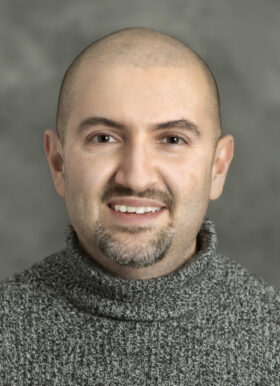Physician Scientist Training Program
The Physician Scientist Training Program (PSTP) in the Department of Pathology & Immunology is committed to training the next generation of physician-scientist leaders in anatomic and clinical pathology. The program focuses on providing support, mentorship, and research experience through the clinical and postdoctoral training years, culminating in a trainee who is highly competitive for investigator-track academic pathology faculty positions.

Although the anatomic and clinical pathology residency programs include time for research training, the department recognizes that training for a career as an independent investigator requires substantial additional research time. The department supports PSTP trainees for up to three years after completion of residency or fellowship to dedicate entirely to research training.
The PSTP combines the intensive clinical training environment of Barnes-Jewish Hospital and its affiliates with rigorous research training in laboratories at Washington University. Trainees choose a research mentor from any of the 2,700 faculty members, representing a range of disciplines including cancer biology, microbiology, biomedical engineering, immunobiology, genomics, computational sciences, cell biology and biochemistry.
Pictured Above: Current PSTP trainees and leadership in Fall 2024. Front row (left to right): Liang-I Kang, MD, PhD, Zita Hubler, MD, PhD (CP/PSTP), Rebecca Crowther, MD, PhD (AP/PSTP), Margaret Axelrod, MD, PhD (AP/PSTP). Middle row (left to right): Jacqueline Payton, MD, PhD, Amanda Wong, MD, PhD (AP), Alicia Vagnozzi, MD, PhD (AP/NP), Taylor Wilson, MD, PhD (CP), Nima Mosammaparast, MD, PhD. Back row (left to right): Emilie Russler-Germain, MD, PhD (AP/NP), Kaleigh Roberts MD, PhD (AP/NP), Alexander Wein MD, PhD (AP)
Eligible applicants include graduates with a combined MD-PhD degree or an MD degree and a strong record of research experience. Applicants must fulfill all eligibility requirements for anatomic or clinical pathology training. The most competitive candidates will have a strong commitment to a research career in academic medicine and an outstanding academic and research record.
Candidates must apply to the anatomic or clinical pathology residency programs or the combined anatomic and neuropathology (AP/NP) program through the ERAS (Electronic Residency Application System) and should be registered through the NRMP (National Residency Matching Program). Applicants for the combined anatomic and clinical pathology program are not eligible.
Applicants are also encouraged to contact one of the PSTP Co-Directors, Jacqueline Payton, MD, PhD or Nima Mosammaparast, MD, PhD to express interest and obtain additional information about the program. Contact should be made as early as possible; it is not necessary that the ERAS applications be complete prior to contacting the directors.
In addition to the ERAS application, candidates should submit the following:
- CV
- Supplemental PSTP application form
- Letter of recommendation from the research mentor that comments primarily about the candidate’s potential for a career as an independent investigator. Letters in the ERAS application are acceptable if they fulfill these criteria.
During the interview season, applicants will meet with clinical and research faculty relevant to their interests. Applicants will present a seminar on their research that will be attended by faculty and trainees who have a range of expertise from clinical and/or research backgrounds. Therefore, please include ~10 minutes of introduction/background and discuss the significance of your findings to your field and to the broader biomedical community.
Trainees complete the clinical training required by the American Board of Pathology for board eligibility in anatomic or clinical pathology, plus fellowship training if appropriate, during the first three-four years of training. During this period, trainees also initiate their research programs. Mentorship is crucial to the PSTP, which includes a collaborative assessment of research training mentors and experiences through regular updates to the PSTP Co-Directors. The goal is to tailor the training experience to foster the development of uniquely trained individuals who will work at the forefront of biomedical science.
At the end of residency/fellowship, trainees embark on up to three years of full-time postdoctoral research training free of clinical commitments, though there are opportunities for continued clinical activities. The selection of an appropriate postdoctoral training environment is crucial to the success of the trainee. To assist in this selection process, trainees will have (in addition to intensive mentoring) the opportunity to attend annual retreats offered by each department and research program within the Division of Biology and Biomedical Science (DBBS). Importantly, trainees can complete their postdoctoral research training in any laboratory at Washington University.
PSTP mentorship continues throughout postdoctoral training, with trainees presenting research-in-progress style talks in regular meetings of the Pathology PSTP. Discussions are encouraged to give feedback to the trainee from other trainees and the PSTP Co-Directors. In addition, trainees have annual meetings with PSTP Co-Directors to discuss their progress and plans for the coming year. Finally, Pathology PSTP trainees have access to career development programs supported by the WashU Medicine Division of Physician-Scientists and other Departments’ physician-scientist programs.
During the postdoctoral research training years, PSTP trainees receive a salary supplement of $15,000 per year in addition to the PGY level salary. Senior trainees are encouraged to apply for mentored career awards to facilitate their transition to independent faculty positions. Funding sources include NIH K and DP mechanisms and foundation grants, such as the Burroughs Wellcome and ASH Scholar Awards. The PSTP provides guidance and advice for trainees assembling an application. The PSTP has an excellent track record of trainees competing successfully for these awards.
Division of Physician-Scientists
Supporting career development of physician-scientists by providing a blend of resources, mentorship and programs at all career stages.
Skill Development for Educators
Giving and Receiving Feedback
Presented by Sarah Bean, MD, Duke University School of Medicine, Pathology
Grand Rounds recording presented October 29, 2020


